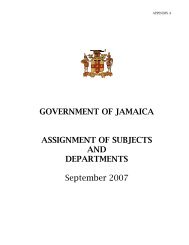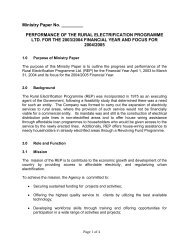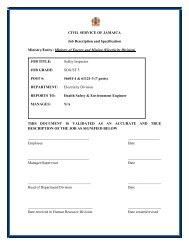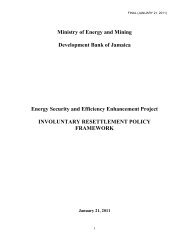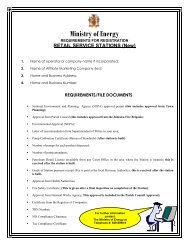Executive SummaryThis report covers the initial phase <strong>of</strong> a project, sponsored by the Organization <strong>of</strong> AmericanStates, to lend technical assistance and policy support for the development <strong>of</strong> a bi<strong>of</strong>uelsindustry in <strong>Jamaica</strong>. The findings presented here, in conjunction with policy analysis conductedseparately for the government’s <strong>Bi<strong>of</strong>uels</strong> Task Force, will form the basis <strong>of</strong> additional activitiesto be carried out in the future, including public education and awareness, pilot projectdevelopment, and ultimately implementation in the form <strong>of</strong> investments in bi<strong>of</strong>uels productioncapability.Based on its research, the project team reached several conclusions regarding the prospects fora <strong>Jamaica</strong>n bi<strong>of</strong>uels industry:With 47,000 hectares <strong>of</strong> suitable land available for sugar cane, <strong>Jamaica</strong> has thecapability to produce all the sugar and molasses the nation needs for its domesticconsumption and rum production plus enough ethanol for 10 percent blending ingasoline (E10) throughout the island. Increasing yields per hectare could expandproduction significantly above this level, as well as reducing cost.Ethanol production from cane can be cost-effective but will require year-roundoperation for efficient utilization <strong>of</strong> the distillery and a market for surplus energy in theform <strong>of</strong> reliable electric power. All-season operation will require economically increasingavailable feedstock to the distillery and providing supplemental fuel for thecogeneration power plant.Various ways to increase distillery feedstock should be considered, including: extendingthe cane harvesting season by introducing varieties <strong>of</strong> sugar cane or perhaps sweetsorghum that are suited to early/late harvesting, using partially processed and storedcassava, and storing concentrated whole sugarcane juice and/or molasses,Concerning supplemental fuel, <strong>Jamaica</strong> has plenty <strong>of</strong> land to grow biomass crops,including bamboo, for <strong>of</strong>f-season sugar mill operation or other uses. Sorghum and canevarieties selected for energy value are other possibilities. Field trials, such as thePetroleum Corporation <strong>of</strong> <strong>Jamaica</strong>’s fuelwood demonstration project at Font Hill Farm,are necessary to evaluate energy crop species, perfect cultivation and harvestingtechniques, and refine cost estimates. The aim has to be to ensure that the average cost<strong>of</strong> supplemental fuel remains below the average proceeds from sale <strong>of</strong> electricity to thegrid when supplemental fuel is being used.In general terms, the cost <strong>of</strong> processing vegetable oils into biodiesel are inapproximately the same range as refining petroleum (US $ 0.50 per gallon), so the oilfeedstock has to cost less than crude oil to be pr<strong>of</strong>itable without subsidies in some form.4
All countries with commercial biodiesel subsidize it one way or another, e.g., throughlower excise taxes or mandatory use. Based on Brazilian experience, the cost <strong>of</strong> smallscaleproduction <strong>of</strong> castor beans, for example, containing 48% oil, is US $0.50 per Kilo($1.00 per Kilo <strong>of</strong> oil), which amounts to $3.40 per gallon, or roughly twice the cost <strong>of</strong>crude oil.Large-scale mechanized production <strong>of</strong> castor or jatropha could be less costly, but itmight also displace sugarcane. As a large-scale field crop, soy might be a betteralternative, since it has food as well as energy value, although it too could compete withcane for land. Another solution would be higher oil-yielding palm trees, which would notcompete with cane for land and could possibly provide solid fuel for <strong>of</strong>f-season sugarmill operation.Adequacy <strong>of</strong> land for biodiesel depends on the crops involved. Ongoing field trials willdetermine the conditions under which castor and jatropha can be cultivated, but othercrops should also be considered as well, including oil palm, provided disease resistantcultivars can be identified.While B5 blending has been discussed as a biodiesel market outlet, <strong>Jamaica</strong>’s diesel fuelconsumption is much greater in stationary engines than in automotive engines, andbiodiesel could be introduced with fewer institutional and technical complexities forelectric generation than for vehicles. Truck and bus fleets represent another applicationthat would not require an island-wide blending program.Although E10 has been established as the national fuel formulation, publiccommunication efforts will still be needed as <strong>Jamaica</strong> builds production capacity,especially in rural communities likely to be affected by new farming practices,construction activities, and changing labor markets. Education and awarenesscampaigns can serve both to elicit stakeholder concerns early enough to accommodatethem, and to lessen resistance to implementation when it occurs.<strong>Bi<strong>of</strong>uels</strong> production is capital intensive, so the <strong>Ministry</strong> <strong>of</strong> Finance has an important roleto play in creating a positive financial framework for investments to occur. Thisframework should reflect the economic merits <strong>of</strong> supporting domestic production,including job creation, rural development, etc. compared to welfare costs and spendingforeign currency to import liquid fuels.5




